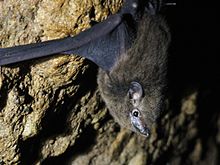Pacific sheath-tailed bat
| Pacific sheath-tailed bat | |
|---|---|

| |
| Scientific classification | |
| Domain: | Eukaryota |
| Kingdom: | Animalia |
| Phylum: | Chordata |
| Class: | Mammalia |
| Order: | Chiroptera |
| Family: | Emballonuridae |
| Genus: | Emballonura |
| Species: | E. semicaudata |
| Binomial name | |
| Emballonura semicaudata Peale, 1848 | |

| |
| Pacific sheath-tailed bat range (red — extant, black — extinct) | |
The Pacific sheath-tailed bat or Polynesian sheath-tailed bat (Emballonura semicaudata) is a species of sac-winged bat in the family Emballonuridae[2] found in American Samoa, Fiji, Guam, Micronesia, Palau, Samoa (where it is called pe'a vai, tagiti or pe'ape'a vai), Tonga, and Vanuatu. Its natural habitat is caves.
In 2013, Bat Conservation International listed this species as one of the 35 species on its worldwide priority list for conservation.[3] It is threatened by habitat loss. There are estimated to be approximately 500 individuals of the subspecies E. s. rotensis.[4] Currently known to roost in only three caves, E. s. rotensis is vulnerable to changes in the local habitat, including indirect impacts caused by invasive species such as goats[4] which limit its carrying capacity.
References
- ^ Waldien, D.L.; Scanlon, A. (2021). "Emballonura semicaudata". IUCN Red List of Threatened Species. 2021: e.T7669A22135085. doi:10.2305/IUCN.UK.2021-1.RLTS.T7669A22135085.en. Retrieved 14 November 2021.
- ^ Simmons, N.B. (2005). "Order Chiroptera". In Wilson, D.E.; Reeder, D.M (eds.). Mammal Species of the World: A Taxonomic and Geographic Reference (3rd ed.). Johns Hopkins University Press. pp. 312–529. ISBN 978-0-8018-8221-0. OCLC 62265494.
- ^ "Annual Report 2013-2014" (PDF). batcon.org. Bat Conservation International. August 2014. Archived from the original (PDF) on July 7, 2017. Retrieved May 1, 2017.
- ^ a b Welch, Jessica Nicole; Fordyce, James A.; Simberloff, Daniel S. (2016-09-01). "Indirect impacts of invaders: A case study of the Pacific sheath-tailed bat (Emballonura semicaudata rotensis)". Biological Conservation. 201: 146–151. Bibcode:2016BCons.201..146W. doi:10.1016/j.biocon.2016.07.004. ISSN 0006-3207.

